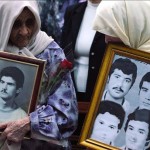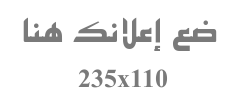المفقودون في لبنان: لغزٌ بلا حل
 في الثالث عشر من نيسان، يُصادف مرور 37 عاماً على بداية الحرب الأهلية اللبنانية التي قُتل وخُطف خلالها الآلاف من المواطنين اللبنانيين والفلسطينيين، الذين لا يزال أهلهم يطالبون بكشف مصيرهم.
في الثالث عشر من نيسان، يُصادف مرور 37 عاماً على بداية الحرب الأهلية اللبنانية التي قُتل وخُطف خلالها الآلاف من المواطنين اللبنانيين والفلسطينيين، الذين لا يزال أهلهم يطالبون بكشف مصيرهم.
السيدة وداد حلواني هي أحد هؤلاء الناشطين. خُطف زوجها على أيدي الميليشيات اللبنانية (القوات اللبنانية) في 24 أيلول/ سبتمبر 1982. تترأّس اليوم لجنة أهالي المخطوفين والمعتقلين في لبنان العاملة على كشف مصير المفقودين والمخطوفين خلال الحرب الأهلية اللبنانية. معها كانت هذه المقابلة:
- · كم يبلغ عدد المفقودين والمخطوفين في لبنان؟
لا يوجد احصاء علمي دقيق حول عدد المفقودين والمخطوفين في لبنان ولكن يوجد عدد تقديري وهو 17000 مفقود ومخطوف. فالدولة لم تجرِ اي احصاء دقيق ونحن كلجان لم نجرِ ايضا اي احصاء لان عمل كهذا بحاجة لجهاز مادي وبشري كبير ونحن تبنينا هذا الرقم. لم يُعرف مصير احد حتى الان وهنلك حالات كثيرة لأشخاص خرجوا من منازلهم ولم يعودوا.
الدولة تعيسة في التعامل مع ملف المخفيّين قسراً بشكل عام أكانوا في سوريا او في اسرائيل، رغم الأفضلية الصُورية التي أعطتها الدولة للمُعتقلين في اسرائيل على المعتقلين في سوريا وذلك لاسباب سياسية. اليوم هناك ثلاث جمعيات تعمل على ملف المفقودين في لبنان، لجنة المعتقلين والمفقودين في لبنان “سوليدا” والتي يترأسها السيد غازي عاد. ولجنة أهالي المفقودين والمعتقلين في لبنان ولجنة المتابعة للمعتقلين والتي يترأسها السيد وفيق صفا. تتشارك هذه الجمعيات العمل مع الاهالي الذين يملكون بعض الوثائق والتي تساعد في كشف مصير ابنائهم، فهذا موضوع انساني وفيه الكثير من المسؤولية. وبحسب الملفات والأدلة فإن العدد الاكبر من المفقودين والمخطوفين فُقِد داخل اراضي لبنان على ايدي الميلشيات التي تقاتلت في الحرب، بالإضافة للاعداد المتواجدة في سوريا واسرائيل.
- · ما هو الفرق بين المُعتقل والمُختطف؟
المُعتقل هو الشخص المعروف من هي الجهة التي قامت باعتقاله، بينما المُختطف هو الشخص المفقود غير المعروف من هو الطرف الذي قام باعتقاله.
يُطلق على المفقودين في لبنان أثناء الحرب الأهلية إسم (ضحايا الإختفاء القسري) الذي يعرّف المخفي قسراً بأنّه الشخص الذي تم توقيفه على أيدي السلطات المُسيطرة أو قوى الأمر الواقع.
وإلى جانب المخفيين قسراً في لبنان هناك عدد آخر من المخفيين في إسرائيل (150 ملفاً) وفي سوريا (600 ملف).
- · هل ما زال هناك مفقودون في إسرائيل؟
نعم، من المعروف أنّه جرت عدة عمليات تبادل بين لبنان وإسرائيل على مراحل مختلفة، والتي كان آخرها وأبرزها العملية التي قام بها حزب الله (الوعد الصادق) نيابة عن الدولة اللبنانية في السادس عشر من تموز/ يوليو 2008 والتي على إثرها تم الإفراج عن عميد الأسرى اللبنانيين في سجون الإحتلال الإسرائيلي السيّد سمير القنطار وتسلّم رفات العشرات من المفقودين في اسرائيل، ولكن ما زال هناك مفقودين في اسرائيل مثل يحيا سكاف ودلال المغربي ويحيا الخالد وغيرهم بالإضافة إلى ما يُعرف بإسم مقبرة الأرقام التي ترفض سلطات الإحتلال الإسرائيلي إعطاء أي معلومات بخصوصها والتي يُعتقد أنها تضم رفات بعض الشهداء الذين سقطوا في العمليات التي جرت أثناء الإحتلال الإسرائيلي لجنوب لبنان.
- · هل تمّت أي عملية تبادل للأسرى بين لبنان وسوريا؟
تمّت عدة عمليات تبادل للأسرى بين لبنان وسوريا وكان ذلك بمبادرة من الدولة السورية وليس من الحكومة اللبنانية، وهنا أريد أن أذكر أمراً مهماً بالنسبة للأشخاص الذين عادوا. عند لقائنا معهم قالوا لنا عن ما تعرضوا له في السجون من ضرب وتعذيب وتنكيل وأيضاً أريد أن أذكر أنّ منهم من عاد جثة هامدة ومُنع الأهل من إقامة العزاء له و دفن سراً. آخر دفعة تبادل للأسرى بين لبنان وسوريا جرت في كانون الاول 2000 وكانت الدولة اللبنانية حينها تنفي وجود معتقلين في سوريا. انذاك كان لبنان ما يزال تحت الوصاية السورية. حينها أعلن الرئيس بشار الاسد عن مبادرة حسن نيّة وأخرج المعتقلين.
عندما كنا نقابل وزير العدل حينها، عدنان عضوم، كان ينفي وجود لبنانين في السجون السورية. وفي المقابل كانت السلطات السورية تعترف بوجودهم. نحن كممثلين للجان نقول ان المخطوف و المخفي قسراً هو انسان في الدرجة الاولى، تعرّض لإنتهاك حقوقه. نحنُ علينا ان ندافع عن حقوق الانسان وعلينا معرفة مصيره أينما كان، فإذا هو حيّ نريد حريته وإذا هو ميت نريد رفاته لدفنه بطريقة تليق به وتكريم الميت يكون بدفنه بطريقة لائقة.
في العام 2000 بعدما ضغطنا على السلطات المسؤولة وأطلقنا حملة (من حقنا أن نعرف مصيرهم) انبثق عن هذه الحملة لجنة رسمية ونحن اعتبرناه اول اعتراف رسمي بقضية المفقودين. عملت هذه اللجنة وكُلِّفت بالاستقصاء لكنها لم تعطَ صلاحيات، واصدرت تقريرها بعد 6 اشهر من العمل و الذي جاء فيه أنها لم تجد أحياء في لبنان من المفقودين. والسوريون أكّدوا بأن ليس لديهم في السجون معتقلين واسرائيل لم تعترف ايضاً إلا بـ17 أسير لبناني في سجونهاـ لكن التقرير افاد بوجود الكثير من المقابر الجماعية في لبنان.
- · ما هي المشاكل التي تواجهكم بما يتعلّق بموضوع المقابر الجماعية في لبنان؟
المقابر الجماعية هي عبارة عن جرائم حرب والدولة اعتبرت أن المخطوفين قد ماتوا ولم يعد هناك من سبب للأهالي بالمطالبة بكشف مصير ابنائهم. كل مقبرة هي بمثابة أدلة دامغة للجرائم التي ارتكبت بحق الانسانية وحقوق الانسان ونحن نصر على حفر المقابر بشكل علمي ودقيق ودفن الرفات بشكل لائق.
مؤخراً ذهبنا الى سراييفو حيث التقينا بوفد من أهالي المفقودين وبعض النواب والقضاة وإعلاميين، هناك اطلعنا على تجربتهم التي شهدت حرباً اهلية شبيهة بالحرب اللبنانية (اقتتال عرقي وطائفي) حيث سقط نتيجة المعارك الكثير من المفقودين والقتلى والجرحى. إن تجربة سراييفو تجربة رائدة وتحترم مواطنيها (أحياء او أموات) حيث تنقلنا بين المختبرات والمراكز وشاهدنا كيف يتم التعامل مع الجثث والعظام وكيف يجمعون رفات الشخص بأكمله. ويصادف شهر تموز/ يوليو الذكرى السنوية لأكبر مجزرة حصلت ويقام لهم احتفال لدفنهم في المقبرة، وتحولت الى نصب تذكاري. وتجربة سراييفو معمّمة على العديد من الدول مثل المكسيك والأرجنتين والبرازيل والمغرب حيث قام الملك الحالي بإنشاء لجنة المصالحة والحقيقة وفتحوا ملف كل سنوات القمع التي مورست في عهد والده.
نحن نريد كشف مصير هؤلاء كما تنص الأعراف والقوانين والمعاهدات الدولية، ونحن لا نطالب بتعليق المشانق للمجرمين حيث صدر قانون العفو بعد نهاية الحرب الاهلية. أثناء سنوات الحرب كانت الدولة تقول (العين بصيرة واليد قصيرة) وسلطة المليشيات كانت اقوى من سلطة الدولة، وفي العام 1992 انتهت الحرب وحلّ السلام ولكن الدولة استمرت بالتقصير وبالمزيد من الوعود الكاذبة. كانت تقول الاولوية هي في بناء السلام وفتح صفحة جديدة وإعادة الإعمار وتحرير الجنوب من العدو الإسرائيلي، وبعدها تحجّجت الدولة بالوصاية السورية والضغط السوري عليها حينها كان اهالي المعتقلين في السجون السورية يواجهون بالقمع مع كل تحرك. بعد خروج الجيش السوري من لبنان وغياب الوصاية عنه في 2005 لم يعد لديهم حجج، فالحرب انتهت و تحرّر الجنوب وخرج السوريون ولكن اللجنة ووجِهت بتقصير كلّي من الدولة اللبنانية علماً ان آخر ثلاث حكومات تعاقبت على لبنان والرئيس ميشال سليمان وخطاب القسم تعهّد بحل هذه القضية الإنسانية، وبيانات الثقة لآخر ثلاث حكومات وعدت بحل القضية ولكن الوعود مازالت حبراً على ورق.
نحن لا نطالب بمعاقبة الفاعلين ولا بإلغاء قانون العفو، نحن نطالب بحقنا في معرفة وكشف مصير جميع المخطوفين والمفقودين. وزير الخارجية السوري، وليد المعلم، وفي اول زيارة رسمية الى لبنان بعد نيسان/ ابريل 2005 قال: قبل مطالبتنا نحن كسوريين بالمفقودين والمعتقلين، ابحثوا في المقابر الجماعية في لبنان اولاً.
إن الأهالي معلقون بحبال الهواء ويوجّهون اتهاماتهم بصورة عفوية مبنية على العاطفة. عندما انتهت الحرب اصبح المسلمون من اهالي المخطوفين يتّهمون القوات اللبنانية بتسليم أبنائهم المخطوفين لإسرائيل والمسيحيين يتّهمون حركة أمل والحزب التقدّمي الإشتراكي بتسليم أبنائهم المخطوفين لسوريا، فكانت النتيجة أن توجّهت أصابع الإتهام الى سوريا وإسرائيل وكأن الميلشيات المتقاتلة لم يكن لها علاقة بما جرى!!
المشكلة الأساسية لدينا هي غياب القرار السياسي الداخلي لحل هذه القضية. وللمقارنة الحرب في البوسنة انتهت بعد الحرب اللبنانية والمسؤولون هناك شكلوا قوانين وهيئات للحل بالشكل المناسب وعلينا تعميم تجربتهم. هذه القضية مركزية وتُمثل جميع الطوائف والمناطق، هي قضية وطنية شاملة والمجتمع اللبناني بأكمله مسؤول عنها، والعدالة لا يمكن أن تتحقق إلا إذا حملها المجتمع المدني واعتبرها قضيته المركزية لذلك أنا أدعو إلى تضافر عمل الجمعيات في هذا الإطار والى عدم تبديد الجهود، فالذاكرة هي ذاكرتنا جميعاً، علينا التوعية لعدم تكرار الماضي وعلينا معرفة الماضي لتفادي اعادة الاخطاء في المستقبل.






























